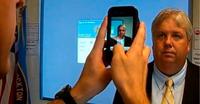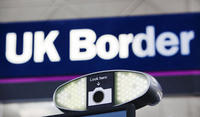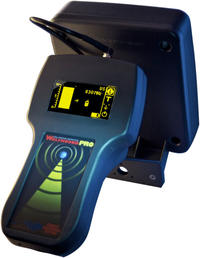-
Portable biometric system for police officers

Police now have a new low-cost, portable biometric tool in their arsenal to quickly and accurately identify a suspect: an Apple iPhone; using MORIS (Mobile Offender Recognition and Information System), an app developed by BI2 Technologies, police officers can now use an Apple iPhone to scan a suspect’s fingerprint or snap a photo of their face to scan their iris
-
-
Taser death leads to $10 million payout
The manufacturer of police Tasers recently awarded $10 million to a North Carolina family after a teenager was killed when he was shocked with a stun gun; Darryl Turner, a seventeen year old boy, died in a supermarket after a police officer shot him in the chest with a Taser Model X26 electronic control device in 2008
-
-
Gwinnet County, Georgia to issue instant e-tickets
In the past, in Gwinnet County, Georgia, like in many counties across the United States, residents would not see a traffic ticket on their records until several weeks later, but now thanks to new technology, police officers, fire marshals, and animal control agents will be able to issue and print citations immediately
-
-
Taser, Metal Storm collaborate on less lethal ammunition

TASER International has entered into a Memorandum of Understanding (MoU) with Metal Storm Limited and to develop and market TASER less-lethal ammunition for the Metal Storm MAUL weapon; Metal Storm’s MAUL weighs 800 grams can be fitted as an accessory to an assault rifle, or operated from its own shoulder stock or pistol grip attachments
-
-
Next generation firewall market to grow 24 percent annually through 2014
The global next-generation firewall market will grow at a CAGR of 24 percent over the period of 2010-14; the market is currently being driven by the increasing number and intensity of security threats on the Web
-
-
Water purification unit generates its own energy
A new biological water purification facility developed by Siemens generates enough methane gas to power its own operations; it also produces much less sludge than conventional systems; the test facility is mlocated in Singapore, and the city state is building a much larger pilot facility — one that will process 300 times more effluent than its predecessor, or about as much sewage water as is produced by around 1,000 people
-
-
Heathrow deploys face-recognition scanners

Heathrow Airport is deploying facial recognition scanners at two of the airport’s terminals; the technology aims to help prevent a scenario in which an international passenger swaps tickets with a domestic passenger in the departure lounge
-
-
Anthrax vaccine program demonstrates 36 month product stability
Maryland-based PharmAthene has achieved an important program milestone in its recombinant protective antigen (rPA) anthrax vaccine program, and demonstrated thirty-six month stability of its rPA drug product candidate; the data suggest that the rPA product candidate is both highly stable and potent; stability has historically been a stumbling block for other recombinant anthrax vaccine programs
-
-
Private contractors outnumber government security two to one

A recent survey found that the number of private security contractors outnumber police officers two to one around the world; in some countries, the difference between private security contractors and law enforcement officials is even more significant; the report also noted several critical emerging issues as a result of the increasing use of private contractors including oversight, the role of government, and concerns for public safety
-
-
L-1 Identity, Safran merger given green light
The Committee on Foreign Investment in the United States (CFIUS) recently gave the go ahead to French defense firm Safran SA to close its bid for L-1 Identity for $1.6 billion
-
-
BVS combats jail cell phone smuggling

Prisons across the United States are struggling to prevent cell phones from falling into inmates’ hands; in 2010 more than 10,000 contraband cell phones were confiscated from inmates in California prisons; to help officials crack down on these contraband items, Berkeley Varitronics Systems has developed a suite of sophisticated cell phone detectors that can “sniff” out phones even when they are hidden in the most obscure places
-
-
PositiveID releases groundbreaking new biothreat detector
PositiveID Corporation recently unveiled its new Multiplex BioThreat Assay, which the company says is the first of its kind; according to PostiveID, its latest device is the first commercially available detector that can diagnose up to six bio-threat organisms in the Centers for Disease Control’s category A and B lists in a far shorter time than existing methods
-
-
The art of signature replication
A Rockville, Maryland company’s signature replication technology is so advanced, DHS sends its agents there to learn; using sophisticated computer software and its Autopen signing machines, Damilic is capable of replicating signatures that so closely resemble the original hand written version, forensic scientists are needed to be able to tell the difference
-
-
Recent deluge of cyber attacks results in record spending
The deluge of high profile cyber attacks on major corporations and government entities like the U.S. Senate, the CIA, and Sony has driven a sharp increase in demand for cyber security experts; in the first six months of this year alone, cyber attacks and data breaches have cost U.S. companies approximately $96 billion, nearly the total for 2010; analysts project 2011 to be the busiest year yet with an estimated $75.6 billion in cyber security spending, surpassing last year’s record $63 billion
-
-
New tools identify a person's expression, estimate their mood

Biometrics company releases software that allows users to “cartoonize” photos; cartoons aside, the company announced the release of more free API (application programming interface) face detection tools: the service can identify a person’s expression as well as estimate their mood
-
- All
- Regional
- Water
- Biometrics
- Borders/Immig
- Business
- Cybersecurity
- Detection
- Disasters
- Government
- Infrastructure
- International
- Public health
- Public Safety
- Communication interoperabillity
- Emergency services
- Emergency medical services
- Fire
- First response
- IEDs
- Law Enforcement
- Law Enforcement Technology
- Military technology
- Nonlethal weapons
- Nuclear weapons
- Personal protection equipment
- Police
- Notification /alert systems
- Situational awareness
- Weapons systems
- Sci-Tech
- Sector Reports
- Surveillance
- Transportation
Advertising & Marketing: advertise@newswirepubs.com
Editorial: editor@newswirepubs.com
General: info@newswirepubs.com
2010-2011 © News Wire Publications, LLC News Wire Publications, LLC
220 Old Country Road | Suite 200 | Mineola | New York | 11501
Permissions and Policies
Editorial: editor@newswirepubs.com
General: info@newswirepubs.com
2010-2011 © News Wire Publications, LLC News Wire Publications, LLC
220 Old Country Road | Suite 200 | Mineola | New York | 11501
Permissions and Policies
